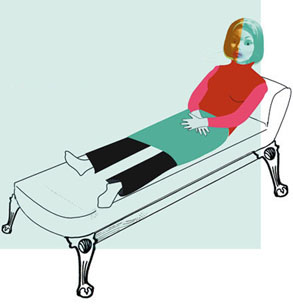Dear Dr. Ponton,
I have two girls, ages 9 and 11. They seem pretty well adjusted, though we had some rough times when I separated from their father two years ago, and I’m not looking forward to what might happen if or when we finally divorce. Right now, they seem fairly happy, and we get along very well.
Like all humans, my daughters have their strengths and weaknesses. The weaknesses that seem to cause them the most trouble and distress just happen to be weaknesses that I share. I would really love to help the younger one get over her belief that she doesn’t “deserve” to be happy, but I never figured out how to overcome this feeling in myself, therapy notwithstanding. I thought it was my harsh and punitive parents’ fault that I turned out that way, but I strive to be loving and forgiving with my children, so what’s going on here?
I would love to help the older one learn to budget her time and develop a work ethic, but I’m a severe procrastinator and get bored with “applying myself” — just like when I was a kid. I feel like a hypocrite trying to advise my kids on these things when I so obviously never learned the solutions. How can I steer them away from behaviors that will cripple them in adulthood?
— Reflecting Mother
Although this mother’s letter resonates with frustration, self-doubt, and deprecation of her parenting skills, I am impressed with her evident strengths and insight. In her letter she courageously bares weaknesses, hoping to make her daughters’ lives better. She suggests that even if we choose a parenting style different that of our own parents (in her case a switch from punitive to supportive), we may see generationally repeated behaviors in our children, and may find ourselves unable to help them. In other words, we get the distinct impressions that biology and family are destiny.
Are we really going to see our worst traits reflected in our children’s behaviors? This is an important question that most parents wonder about silently. This mother worries out loud that we are doomed to carry these crippling traits, and live them twice through our children’s lives. This mother also raises unspoken questions about how much is transferred between generations, and what, if anything, can be done to alter this process.
First, it is important to point out that, in the period between separation and divorce, concerned and loving parents always worry and frequently feel guilty about their actions. Many are looking — oh so carefully — for negative consequences. They focus on what they view as their personal negative characteristics, just as this mother is doing. Never does the parental mirror reflect such a dark vision of parental behavior.
But negative aspects of life — including actions, traits, and fears — often are exaggerated in the middle of a serious trauma. Things are not always what they seem, and counseling or supportive psychotherapy can clarify the situation and ease the pain. This mother admits that she has tried therapy already and failed. However, it has helped her accomplish at least one thing. She has become a different mother from her own and she has two happy daughters — a huge accomplishment. The pursuit of personal happiness and self-acceptance is often a long road that occupies a lifetime, but it is key that this mother continues her search, for her daughters and herself.
When we do recognize our most challenging traits reflected in our children, I think it is important to admit that we share them. It is also critical to tell our children that we, as adults, have sometimes struggled with these problems for decades, and know what it is like to live with them. This mother understands her tendency to self-deprecation and procrastination, and this information can be valuable to her daughters if it is shared in a nonjudgmental manner. (“You are just like me,” is not the best opener, however.)
For example, I often drive too quickly. Sitting in the back seat, my daughters have been witnesses to this more times than I care to remember. I have watched them imitate this behavior as teens, and this has been a big motivator in dealing with it — for all of us. I have talked openly about my own transgressions in this regard, and we have frequent discussions about what constitutes safe driving. We are able to help each other. This is what it is to be human, and by admitting to weaknesses, the mother can be a strong role model.
In addition to looking at her own response, this mother should continue to give both daughters a lot of encouragement and positive feedback, making sure to demonstrate the capacity for self-care. By eating well, sleeping well, and doing things that she finds enjoyable, this mother prepares for challenges, and communicates the importance of self-care to her daughters.
As frazzled and worried as she feels, this mother is doing a lot already. I would urge her, above all, to step back in order to see how competent she is as a parent, even in a time of crisis.


